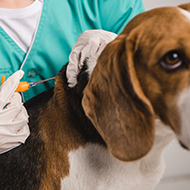Warning over scam microchip registry

The database quoted by UK Pet Chip Registry does not conform to UK government standards.
The Chartered Trading Standards Institute (CTSI) has issued a warning about a website advertised on Google that offers pet microchip registration.
The website, named UK Pet Chip Registry, claims that it will add the pet's microchip details to a so-called National Pet Microchip Registration Database for a charge of £15.
The CTSI states that the quoted database fails to meet government standards for pet microchipping, and therefore does not appear on the list of government-endorsed databases.
The warning comes amid a rise in pet ownership during the COVID-19 pandemic. Late last year, Dogs Trust reported a spoke in demand for puppies, and Google searchers for 'Buy a Puppy' increased by 115 per cent since lockdown began.
"It is vital that when purchasing a puppy, members of the public must register the chip on one of the 15 databases verified by the UK government. If they do not, they risk a fine of up to £500,” commented Steph Young, CTSI lead officer for animal welfare.
"The database quoted by UK Pet Chip Registry does not conform to UK government standards, and signing up to it alone puts the user at risk of a fine and the needless cost of the money used to pay for it. The public should always follow government guidance, not paid-for adverts on search engines."
Katherine Hart, a fellow Lead Officer at CTSI, added: "The COVID-19 pandemic has led to a great deal of opportunism and in many cases outright scams. Many people suffer from loneliness during the lockdown, and purchasing a furry companion is an increasingly popular option.
"We are all so much more vulnerable now. The public must be increasingly vigilant, sceptical and above all, check the law and UK government advice when making these decisions. Ignorance of the law excuses no one - make sure you register your pet on a verified database."



 The RCVS has announced a new version of its 1CPD mobile app, with enhanced features for veterinary surgeons and veterinary nurses to record their continuing professional development.
The RCVS has announced a new version of its 1CPD mobile app, with enhanced features for veterinary surgeons and veterinary nurses to record their continuing professional development.